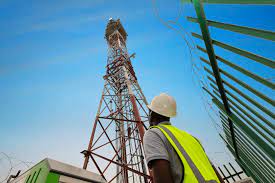IHS Holding has voiced worries that network outages in Nigeria could result from the 2,500 towers being transferred to American Tower Corporation.
This announcement coincides with IHS’s efforts to bargain with MTN Nigeria for improved business terms in exchange for keeping the towers.
Following a competitive process, ATC Nigeria was given the lease for 2,500 sites with IHS, which are scheduled to expire in 2024 and 2025, according to information released by MTN in September. The telecommunications operator highlighted that this agreement will improve the diversity of the tower portfolio and help reduce network costs.
Read also: IHS Towers, Nigeria to create learning communities across 36 states
The agreements made
Karl Toriola, Chief Executive Officer of MTN Nigeria, states that:
“Efficient tower contracts are key in driving cost-effective, deep broadband penetration and leading technology across our operations, and in our quest of achieving differentiated value, we will from time to time review the contracts we have with our partners to ensure they optimally meet our site requirements. But beyond efficiency, we will also focus on cost optimization, green energy utilization, and sustainability.”
In response, IHS Towers Chairman and CEO Sam Darwish told Reuters on Thursday that although the towers make up a small percentage of the company’s total leases, IHS is willing to comply with ATC’s requirements.
He stated, “IHS has offered improved commercial terms on the 2,500 towers to close the gap (between the offers) as our main aim is to prevent network disruption in Nigeria.”
In response, MTN underlined that the agreement with ATC was finalised and reaffirmed its dedication to continuing talks with IHS about prospective prospects, such as the renewal of its remaining sites.
The statement read, ”Our preference is always for bilateral renewal, subject to competitive pricing and terms. In this instance, the ATC proposal was superior,”
Liquid Dataport, VIPNET to boost internet access in West Africa
The future for Nigeria
There have been talks concerning the future of telecommunications in Nigeria because American Tower Corporation just acquired 2,500 towers from IHS Holding. Several elements that impact collaborations, technological breakthroughs, and the industry’s trajectory of development come into play as it navigates this transformation.
After tower transfer, the possibility of more technical advancements in the telecom industry looms big. Now that American Tower Corporation is involved, expectations are higher for developments, especially with regard to 5G technology. The adoption of cutting-edge technologies that promise quicker and more dependable communication may be accelerated by ATC’s engagement.
Within the telecom sector, new partnerships are made possible by the tower transfer. In an effort to improve service quality and promote efficiency, telecom companies and infrastructure suppliers may work together more frequently. Strategic alliances that take advantage of the unique capabilities of various players to build a more resilient and integrated telecom ecosystem may be seen in the changing environment
Evaluating the effect of the tower transfer on network infrastructure investments is a crucial component of Nigeria’s future telecom environment. Local and foreign investors will probably examine the sector closely for stability and growth prospects. The tower transfer might be the start of a phase of larger investments meant to strengthen the nation’s communications infrastructure.
There will likely be a change in the dynamics of market rivalry in the telecoms industry following tower transfer. Major telecom companies’ market share and strategic posture may be impacted by the redistribution of tower assets. The sector is about to undergo a reconfiguration that may bring forth increased innovation, competition, and better services for customers.
The laws and policies of the government will have a significant impact on how the telecom industry develops. The tower transfer may cause regulatory agencies to review and modify existing frameworks. In the post-transfer scenario, telecom businesses’ operations, innovation, and collaboration will be greatly impacted by the regulatory environment.
The influence on consumers is the most important factor taken into account by the industry. Concerns regarding network stability and service quality are crucial as stakeholders strive to improve the entire customer experience. The way the sector responds to these issues will be critical in determining how customers feel and how loyal they are.
The tower transfer’s aftermath could lead to industry-wide efforts and advances. Stakeholders from various telecom sectors can work together on projects that promote expansion and sustainability. New technology, procedures, and standards that improve the whole telecom ecosystem may come from the industry’s combined efforts.
One significant feature of the telecom environment of the future is the possibility of greater worldwide integration and communication. Tower transfers could make Nigeria’s telecom industry a more alluring destination for foreign partnerships and investments. A more linked global telecom network could result from this combination.




